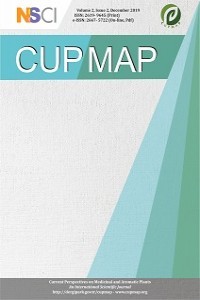NIGELLA SATIVA SEED EXTRACTS PREVENT THE GLYCATION OF PROTEIN AND DNA
NIGELLA SATIVA SEED EXTRACTS PREVENT THE GLYCATION OF PROTEIN AND DNA
___
- Ahmed, N., 2005. Advanced glycation end products-role in pathology of diabetic complications. Diabetes Res. Clin. Pract., 67, 3-21.
- Ahmad, S., Moinuddin, S.U., Khan, M.S., Habeeb, S., Alam, K., and Ali, A., 2014. Glyco-oxidative damage to human DNA – Neo-antigenic epitopes on DNA molecule could be a possible reason for autoimmune response in type 1 diabetes. Glycobiology, 24, 281-291.
- Ali, A., More, T.A., Hoonjan, A.K., and Sivakami, S., 2017. Antiglycating potential of acesulfame potassium: an artificial sweetener. Appl. Physiol. Nutr. Metab., 42, 10, 1054-1063.
- Banan, P., and Ali, A., 2016. Preventive effect of phenolic acids on in vitro glycation. Annals of Phytomedicine-an International Journal, 5, 2, 97-102.
- Brownlee, M., Vlassara, H., and Cerami, A., 1984. Non-enzymatic glycosylation and the pathogenesis of diabetes complications. Ann. Intern. Med., 101, 527-537.
- Friendman, M., 1996. Food browning and its prevention: an overview. J. Agric. Food Chem., 44, 631-653.
- Jakus, V., and Rietbrock, N., 2004. Advanced glycation end-products and the progress of diabetic vascular complications. Physiological Research, 53, 2, 131-142.
- Khan, M.N., and Gothalwal, R., 2018. Herbal origins provision for non-enzymatic Glycation (NEGs) inhibition. Front Medic Chem Drug Dis, 2, 1, 10-15.
- Kikuchi, S., Shinpo, K., Takeuchi, M., Yamagishi, S., Makita, Z., Sasaki, N., and Tashiro, K., 2003. Glycation - a sweet tempter for neuronal death. Brain Res. Brain Res. Rev., 41, 306-323.
- Losso, J.N., Bawadi, H.A., Chintalapati, M. 2011. Inhibition of the formation of advanced glycation end products by thymoquinone. Food Chem. 128, 1, 55-61.
- Mehmood, T., Moin, S., Faizy, A. F., Naseem, S., and Aman, S., 2013. Nigella Sativa as an antiglycating agent for human serum albumin. Int. J. Sci. Res. 2, 4, 25-27.
- Najmi, A., Nasiruddin, M., Khan, R.A., and Haque, S.F., 2012. Therapeutic effect of Nigella sativa in patients of poor glycemic control. Asian J Pharm Clin Res, 5, 3, 224-8.
- Poulsen, M.W., Hedegaard, R.V., Andersen, J.M., Courten, B.de., Bügel, S., Nielsen, J., Skibsted, L.H., and Dragsted, L.O., 2013. Advanced glycation endproducts in food and their effects on health. Food Chem. Toxic., 60, 10-37.
- Rahbar, S., and Figarola, J.L., 2003. Novel inhibitors of advanced glycation end products. Arch. Biochem. Biophys., 419, 63-79.
- Requena, J.R., Vidal, P., and Cabezas-Cerrato, J., 1993. Aminoguanidine inhibits protein browning without extensive Amadori carbonyl blocking. Diabetes Res. Clin. Pract., 19, 23-30.
- Zafar, H., Hussain, F., Zafar, S., and Yasmin, R., 2013. Glycation inhibition by Nigella sativa (Linn) – an in vitro model. Asian J Agri Biol, 1, 4, 187-189.
- ISSN: 2619-9645
- Yayın Aralığı: Yılda 2 Sayı
- Başlangıç: 2018
- Yayıncı: Nazım ŞEKEROĞLU
SOME MEDICINAL PLANTS USED AS FOLK MEDICINE FOR DERMATOLOGICAL DISEASES IN EUROPEAN TURKEY
NIGELLA SATIVA SEED EXTRACTS PREVENT THE GLYCATION OF PROTEIN AND DNA
Rashmi PANDEY, Dinesh KUMAR, Ahmad ALI
AN ETHNOBOTANY STUDY IN ENEZ TOWN FROM EDİRNE
THE EFFECTS OF THE SIDERITIS OZTURKII EXTRACT ON THE EXPRESSION LEVELS OF SOME APOPTOTIC GENES
Ela Nur ŞİMŞEK SEZER, Tuna UYSAL
CHEMICAL COMPOSITION OF THE FIXED AND ESSENTIAL OILS OF NIGELLA SATIVA L. FROM TURKEY
Gülçin AKGÖREN PALABIYIK, Zehra AYTAÇ
SOME CHEMICAL CONTENTS OF VERBASCUM ORIENTALE (L.) ALL. SPECIES SPREADING IN VAN REGION
Murat TUNÇTÜRK, Rüveyde TUNÇTÜRK, Tamer ERYİĞİT
SOME MEDICINAL PLANTS USED AS FOLK MEDICINE FOR COLON CANCER
